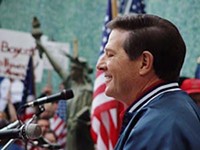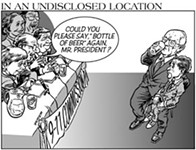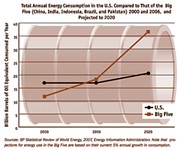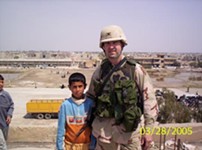The Hubris at Enron
Rarely have convictions been more deserved than those of former executives Ken Lay and Jeff Skilling
By Robert Bryce, Fri., June 2, 2006
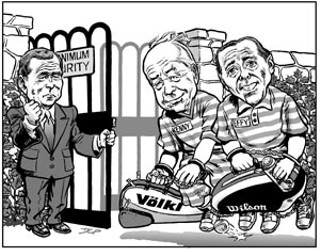
Seldom have criminal convictions been more richly deserved. Last week, a Houston jury found both Jeff Skilling and Ken Lay guilty of various crimes they committed while the duo were heading Houston-based Enron Corp. Together they face nearly 200 years in prison.
If there's one word that can explain why Enron failed and why Lay and Skilling are facing long stints in prison jumpsuits, it's this one: hubris.
Enron failed because its leadership failed in paying attention to the most basic elements of business management. And in the case of Enron, that meant carefully managing its cash flow. It may sound mundane, but businesses go bankrupt because they run out of cash. That's exactly what happened at Enron. And the failure to manage the company's cash is directly attributable to Lay and Skilling. Lay was a Ph.D. economist who couldn't read a cash-flow statement. Skilling was a Harvard M.B.A. who once told another Enron employee that cash "didn't matter." Further, both men took enormous amounts of cash out of Enron in order to fund their lavish lifestyles. For Lay, it was $184.5 million in stock sales in the three years before Enron's bankruptcy. Skilling's stock sales amounted to $70.6 million over that same time period. And of course, those figures don't include the millions they got in salary.
The hubris of both men was on display during their trial. During the few days that I spent in the courtroom, both Lay and Skilling displayed airs of untouchability. That was also true of their defense team – a crew of lawyers who were paid some $38 million. Skilling's lawyer, Daniel Petrocelli, was a master showman, as was Lay's, Michael Ramsey. But their brazen defense strategy was doomed to fail. They contested the government's case by claiming that everything Enron did was "legal." In many cases, that was true, at least in a technical sense. Enron did comply with most of the accounting laws that governed its activity.
That said, both Lay and Skilling purposely misled investors, bankers, and their own employees. In Lay's case, that resulted in convictions for conspiracy, bank fraud, securities fraud, mail fraud, and making false statements to banks. Skilling was convicted of securities fraud, insider trading, and conspiracy. Lay was the one who went to the Enron board of directors and asked them to approve the crooked, off-balance sheet deals cooked up by the company's chief financial officer, Andrew Fastow. Several times in 2001, at a time when Enron's broadband unit was sinking into the toilet, Skilling made public statements in which he insisted that the unit was not only healthy, it was doing a booming business.
In a broader sense, for watchers of the Bush administration, much of the hubris at Enron should prove disgustingly familiar. Indeed, many of the traits that defined Enron also define this regime. Listen to these concepts and see if they sound familiar: Enron's executives claimed the old rules didn't apply to them. Enron was going to remake the world in its image. Enron was going to totally dominate its business. Outsiders (or insiders) who disagreed or raised too many questions were viciously maligned. All the while, Enron was plunging ever deeper into debt and cooking the company's books in order to make it appear healthier than it actually was.
The perverse thing about the convictions of Lay and Skilling is that they allow the Bush White House to crow about how zealously it pursues corporate crooks. And in a purely Machiavellian sense, this conviction is a victory for Bush, who just six years ago, as a presidential candidate, was sitting in a box seat at Enron Field watching a Houston Astros game next to his buddy, "Kenny Boy" Lay. Enron watchers can only hope that a few years from now, some of the same smug Bush cronies who have misled the American public – on issues ranging from weapons of mass destruction in Iraq to Valerie Plame's employment status to torturing suspects to spying on American citizens – will be facing criminal charges of their own.
Former Chronicle staff writer Robert Bryce is the author of Pipe Dreams: Greed, Ego, and the Death of Enron (Public Affairs, 2002) and Cronies: Oil, the Bushes, and the Rise of Texas, America's Superstate (Public Affairs, 2004). He is at work on a book about the international politics of oil.
Got something to say on the subject? Send a letter to the editor.





